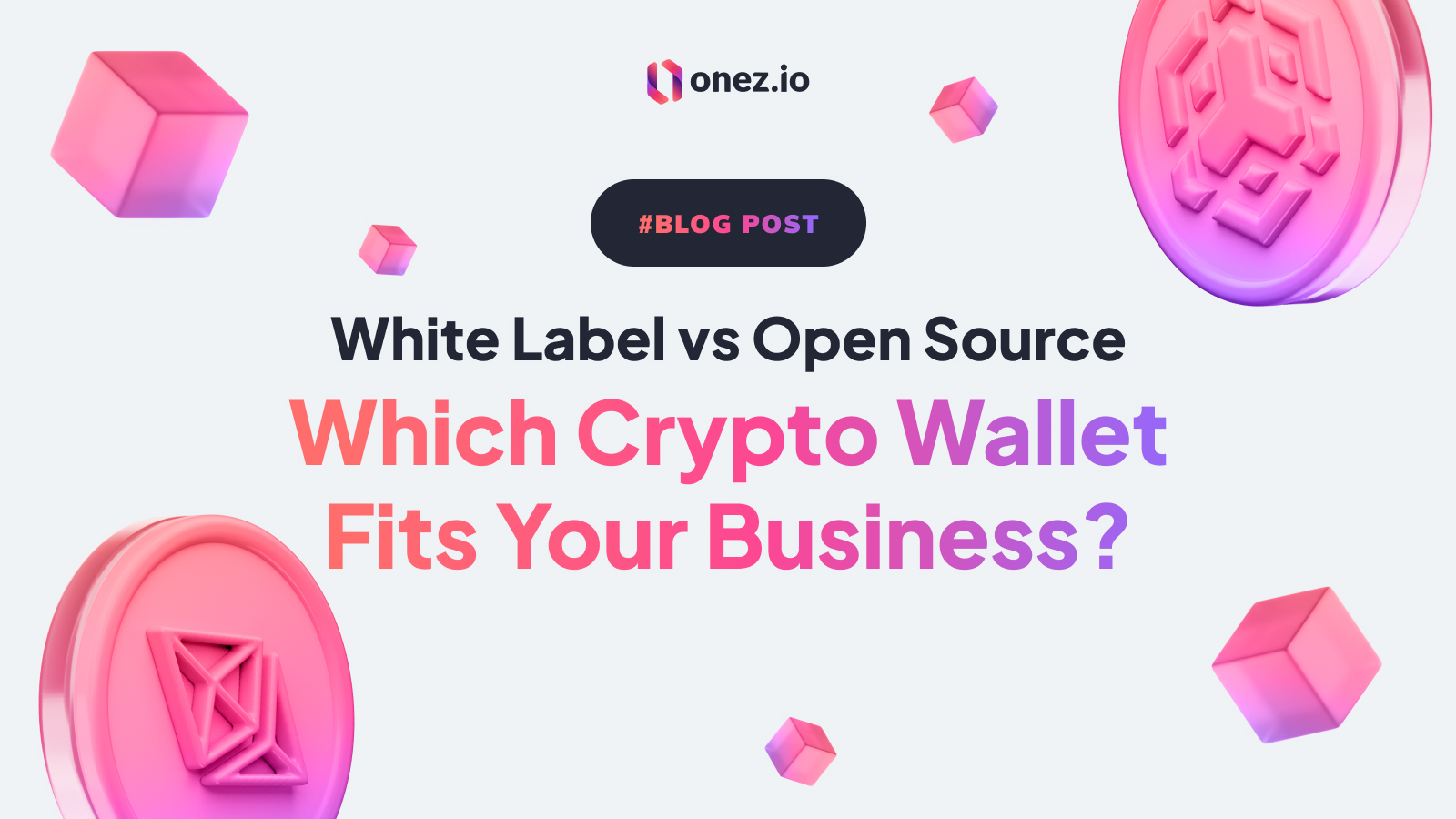Introduction
In the dynamic world of cryptocurrencies, businesses are constantly seeking robust and secure solutions to manage digital assets. Amidst this quest, two types of crypto wallets have emerged as frontrunners – White Label Crypto Wallets and Open Source Crypto Wallets. While both have their merits, the choice between the two often boils down to the specific needs and objectives of the business. This comprehensive guide delves into the nuances of these two types of wallets, highlighting their differences and why White Label Crypto Wallets, particularly the White Label Crypto Wallet App, are becoming the go-to choice for businesses.
Understanding the Crypto Wallet landscape
Crypto wallets are digital tools that allow users to store, send, and receive cryptocurrencies. They come in various forms, each with its unique features and security measures. However, when it comes to businesses looking to offer their customers a seamless and secure crypto experience, the choice often narrows down to White Label and Open Source Crypto Wallets.
The evolution of Crypto Wallets
The concept of a digital wallet to store cryptocurrencies was born alongside the creation of Bitcoin, the first cryptocurrency, by the pseudonymous person (or group) Satoshi Nakamoto in 2009. The first Bitcoin wallet, Bitcoin Core, was an open-source wallet that allowed users to generate a Bitcoin address for sending and receiving the digital currency and to store the private key for it.
As the popularity of Bitcoin and other cryptocurrencies grew, so did the need for secure and user-friendly wallets. Early wallets were primarily desktop-based and required downloading the entire blockchain, which was a cumbersome process. Over time, lighter versions known as ‘light clients’ or SPV wallets were developed, which didn’t require downloading the entire blockchain.
The evolution of crypto wallets has been driven by a need for more security, convenience, and features. Today, we have a variety of wallets including hardware wallets, mobile wallets, web wallets, and even paper wallets. Each type of wallet offers a different balance of security, convenience, and control, catering to different types of users and their needs.
Exploring the types of Crypto Wallets
While White Label and Open Source Crypto Wallets are the focus of this guide, it’s important to understand the broader landscape of crypto wallets. Let’s take a brief look at some of the other types of wallets:
- Hardware Wallets: These are physical devices that store a user’s private keys offline, providing an extra layer of security. They are immune to computer viruses and are considered one of the most secure ways to hold cryptocurrencies.
- Software Wallets: These are applications that can be installed on a computer or mobile device. They are more convenient to use than hardware wallets but are less secure as they are always connected to the internet, making them vulnerable to hacking.
- Web Wallets: These are online wallets that can be accessed through a web browser. They are convenient as they can be accessed from any device with an internet connection, but they are also vulnerable to online threats.
- Paper Wallets: These are physical printouts of a user’s public and private keys. They are secure as they are completely offline and cannot be hacked, but they can be lost or damaged.
White Label Crypto Wallets. Tailored for your business
White Label Crypto Wallets are customizable digital wallets created by third-party providers and sold to businesses under their branding. These wallets offer a high degree of customization, allowing businesses to tailor the wallet’s features and design to align with their brand image and customer needs.
One of the key advantages of White Label Crypto Wallets is the enhanced security they provide. Reputable providers ensure that the wallet’s code is secure and audited by security experts, offering businesses and their customers peace of mind. Moreover, White Label Wallets allow businesses to provide a unique and personalized digital wallet solution, setting them apart from their competitors.
Open Source Crypto Wallets. A double-edged sword
Open Source Crypto Wallets, on the other hand, are publicly accessible, and anyone can view, use, and modify their source code. While this openness can lead to faster innovation and improvements, it also presents significant security concerns. With open-source wallets, there’s no guarantee that the code is secure or hasn’t been tampered with, posing potential risks for businesses and their customers.
Why businesses are opting for White Label Crypto Wallets
For businesses, the choice between White Label and Open Source Crypto Wallets often boils down to three key factors: security, customization, and brand alignment. White Label Crypto Wallets, with their enhanced security features and high degree of customization, offer businesses a way to provide a secure and personalized crypto experience to their customers. Moreover, these wallets can help businesses expand their customer base and enhance their brand image, attracting new users.
Case Studies. Success stories with White Label Crypto Wallets
To understand the real-world impact of White Label Crypto Wallets, let’s look at a few case studies of businesses that have successfully implemented these wallets:
Case Study №1
A fintech startup wanted to offer its customers a secure and easy way to manage their crypto assets. They chose a White Label Crypto Wallet, which allowed them to quickly launch a wallet under their brand without the need for extensive development. The wallet was a hit with their customers, leading to increased user engagement and retention.
Case Study №2
An e-commerce platform wanted to accept cryptocurrencies as a payment method. They implemented a White Label Crypto Wallet, which not only allowed them to accept various cryptocurrencies but also provided a secure wallet for their customers to store and manage their crypto assets. This led to an increase in sales and attracted a new customer base of crypto enthusiasts.
Case Study №3
A gaming company wanted to integrate a crypto wallet into their online games to enable in-game purchases with cryptocurrencies. They chose a White Label Crypto Wallet, which allowed them to seamlessly integrate a secure and user-friendly wallet into their games. This resulted in increased in-game purchases and enhanced the gaming experience for their users.
The Onez White Label Crypto Wallet. A game-changer in the Crypto Space
The Onez White Label Crypto Wallet stands out in the crowded crypto wallet market with its unique features and robust security measures. This self-custody wallet supports all major coins and tokens, including BTC, ETC, BNB, SOL, TRX, and more. It also supports NFTs and staking, allowing customers to easily manage and trade their digital collectibles and earn rewards for holding certain cryptocurrencies in their wallet.
The Onez Wallet offers a personalized dashboard that lets customers view their portfolio, track transactions, monitor the market, and make transactions quickly with saved contacts. Additionally, the multi-wallet feature allows customers to easily manage multiple wallets within the same app, providing a streamlined experience for those who hold a variety of digital assets across different mnemonics.
Furthermore, the Onez Wallet offers institutional-grade security, using a mnemonic phrase for security and privacy, and features Face/Touch ID for additional protection. The transaction history allows customers to track their activity and maintain a comprehensive record of their digital assets.
A deep dive into the features of the Onez White Label Crypto Wallet
To truly appreciate the value that the Onez White Label Crypto Wallet brings to businesses and their customers, let’s take a detailed walkthrough of its features:
- Support for Multiple Cryptocurrencies: The Onez Wallet supports a wide range of cryptocurrencies, including all major coins and tokens. This allows users to manage all their digital assets in one place, making it a convenient solution for those who hold a diverse portfolio of cryptocurrencies.
- NFT and Staking Support: In addition to standard cryptocurrencies, the Onez Wallet also supports NFTs and staking. Users can easily manage and trade their digital collectibles within the wallet, and earn rewards for holding certain cryptocurrencies.
- Personalized Dashboard: The Onez Wallet features a personalized dashboard where users can view their portfolio, track transactions, and monitor the market. This provides users with a comprehensive overview of their digital assets and the crypto market at a glance.
- Multi-Wallet Feature: For users who hold a variety of digital assets across different mnemonics, the Onez Wallet’s multi-wallet feature allows them to manage multiple wallets within the same app. This provides a streamlined and convenient experience for managing diverse crypto assets.
- Enhanced Security: Security is a top priority for the Onez Wallet. It uses a mnemonic phrase for security and privacy, and features Face/Touch ID for additional protection. This ensures that users’ digital assets are kept safe and secure.
- Transaction History: The Onez Wallet provides a comprehensive transaction history, allowing users to track their activity and maintain a record of their digital assets. This is particularly useful for users who make frequent transactions and need to keep track of their spending and earnings.
Comparison of White Label and Open Source Crypto Wallets
To provide a clear understanding of the differences between White Label and Open Source Crypto Wallets, here’s a comparison table:
| Features | White Label Crypto Wallets | Open Source Crypto Wallets |
|---|---|---|
| Customization | High degree of customization to align with brand image and customer needs | Limited customization options |
| Security | Enhanced security with code audited by security experts | No guarantee of secure code |
| Branding | Can be branded as per the business requirements | No branding options |
| User Experience | Can be tailored to provide a unique and personalized user experience | Standard user experience, not tailored to specific customer needs |
| Support | Ongoing support and updates from the provider | Community-driven support and updates |
Future trends in the Crypto Wallet industry
The crypto wallet industry is not immune to the rapid pace of change and innovation that characterizes the broader cryptocurrency market. Here are some of the upcoming trends and predictions in the crypto wallet industry, and how businesses can prepare for these changes:
- Increased Security Measures: As cyber threats continue to evolve, so too will the security measures implemented by crypto wallets. Future wallets may incorporate advanced biometric security features, AI-driven threat detection, and more.
- Integration with Other Financial Services: Crypto wallets could become a one-stop-shop for all financial needs, integrating with banking services, investment platforms, and more. This would provide users with a seamless financial management experience.
- Regulation and Compliance: As cryptocurrencies become more mainstream, regulation will inevitably follow. Future crypto wallets may need to incorporate features to ensure compliance with these regulations, such as identity verification and transaction reporting.
- User-Friendly Interfaces: As more people adopt cryptocurrencies, there will be a growing demand for user-friendly crypto wallets that cater to beginners. Future wallets will likely prioritize intuitive interfaces and provide educational resources to help new users navigate the world of cryptocurrencies.
- Interoperability: With the growing number of cryptocurrencies and blockchain networks, interoperability will become increasingly important. Future crypto wallets may need to support a wide range of cryptocurrencies and be able to interact with different blockchain networks.
Conclusion
In the rapidly evolving world of cryptocurrencies, businesses need a reliable and secure solution to manage digital assets. While both White Label and Open Source Crypto Wallets have their merits, the former, particularly the Onez White Label Crypto Wallet, offers businesses a secure, customizable, and brand-aligned solution that sets them apart in the competitive crypto space. As the industry continues to evolve, businesses that adapt and stay ahead of these trends will be best positioned to succeed.



